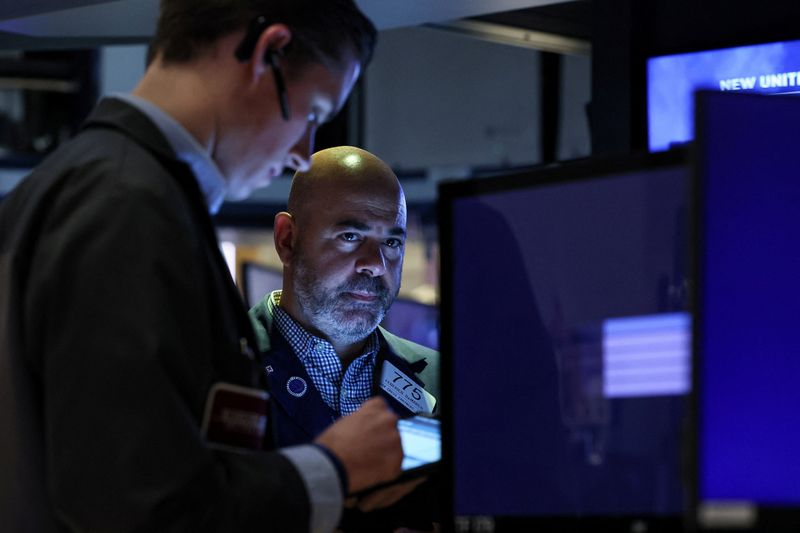By Ankika Biswas and Shashwat Chauhan
(Reuters) - Wall Street's main indexes were set to open lower on Wednesday as growing tensions in the Middle East spurred safe-haven demand, with investors also focused on earnings to gauge the impact of inflation and high interest rates on businesses.
U.S. President Joe Biden arrived in Israel, pledging solidarity in its war against Hamas and backing its account that a blast that killed huge numbers of Palestinians at a Gaza hospital appeared to have been caused not by Israel but by its foes.
Oil prices climbed nearly 2% on concerns about potential supply disruptions, steering a 0.5%-0.6% gain in energy firms Chevron (NYSE:CVX), Exxon Mobil (NYSE:XOM) and Occidental Petroleum (NYSE:OXY) in premarket trading.
Demand for safe-haven assets sent gold prices 1% higher while the dollar also strengthened.
On the earnings front, Morgan Stanley (NYSE:MS)'s third-quarter profit dropped less than expected as a strong performance in its wealth management division offset a hit from a lull in dealmaking. The company's shares, however, fell 2.8%.
Abbott Laboratories (NYSE:ABT) advanced 2.4% after beating third-quarter profit estimates on strong sales of devices, diagnostics products.
Consumer goods maker Procter & Gamble gained 1.8% after its quarterly sales topped market expectations.
EV maker Tesla (NASDAQ:TSLA) and streaming services company Netflix (NASDAQ:NFLX) are scheduled to report quarterly results after market close. Their shares were down 0.7% and 0.8%, respectively.
"Earnings are coming in better than expected. Guidance has been pretty good so far, but the problem with the market is that we have headwinds - rising yields and geopolitical concerns," said Peter Cardillo, chief market economist at Spartan Capital Securities.
"The fundamentals of the market are not that bad. So if we didn't have these headwinds, certainly we would probably be in a solid upward trend based on earnings that have been so far reported."
Data on Tuesday showed U.S. retail sales increased more than expected in September fueling fears of higher-for-longer rates, with the S&P 500 and the Dow ending flat.
Several Federal Reserve officials, including New York's John Williams and board governors Christopher Waller and Michelle Bowman will speak later in the day, ahead of Chair Jerome Powell's remarks on Thursday.
Philadelphia Fed president Patrick Harker said in an interview with the Wall Street Journal that the U.S. central bank should extend its pause on interest-rate increases.
Minneapolis Fed President Neel Kashkari said on Tuesday it had taken much longer than expected for inflation to come down, and it was "still too high".
At 8:39 a.m. ET, Dow e-minis were down 78 points, or 0.23%, S&P 500 e-minis were down 19.25 points, or 0.44%, and Nasdaq 100 e-minis were down 91.5 points, or 0.60%.
Nvidia fell 2.0% following Tuesday's 4.7% drop on lingering concerns over the Biden administration's plans to halt shipments of more advanced AI chips designed by the company and others to China.
United Airlines Holdings lost 5.5% after forecasting weaker fourth-quarter profit due to higher costs. Rivals American Airlines (NASDAQ:AAL) and Delta Air Lines (NYSE:DAL) also shed 1.4% and 1.2%, respectively.
Interactive Brokers Group fell 3.6% after reporting third-quarter results, with brokerages reducing their price targets on the online broker, citing the company's lowered account growth targets.
Card firms Visa (NYSE:V) and Mastercard (NYSE:MA) fell 1.3% and 0.8%, respectively, on a report that Fed will lower debit-card swipe fees.
